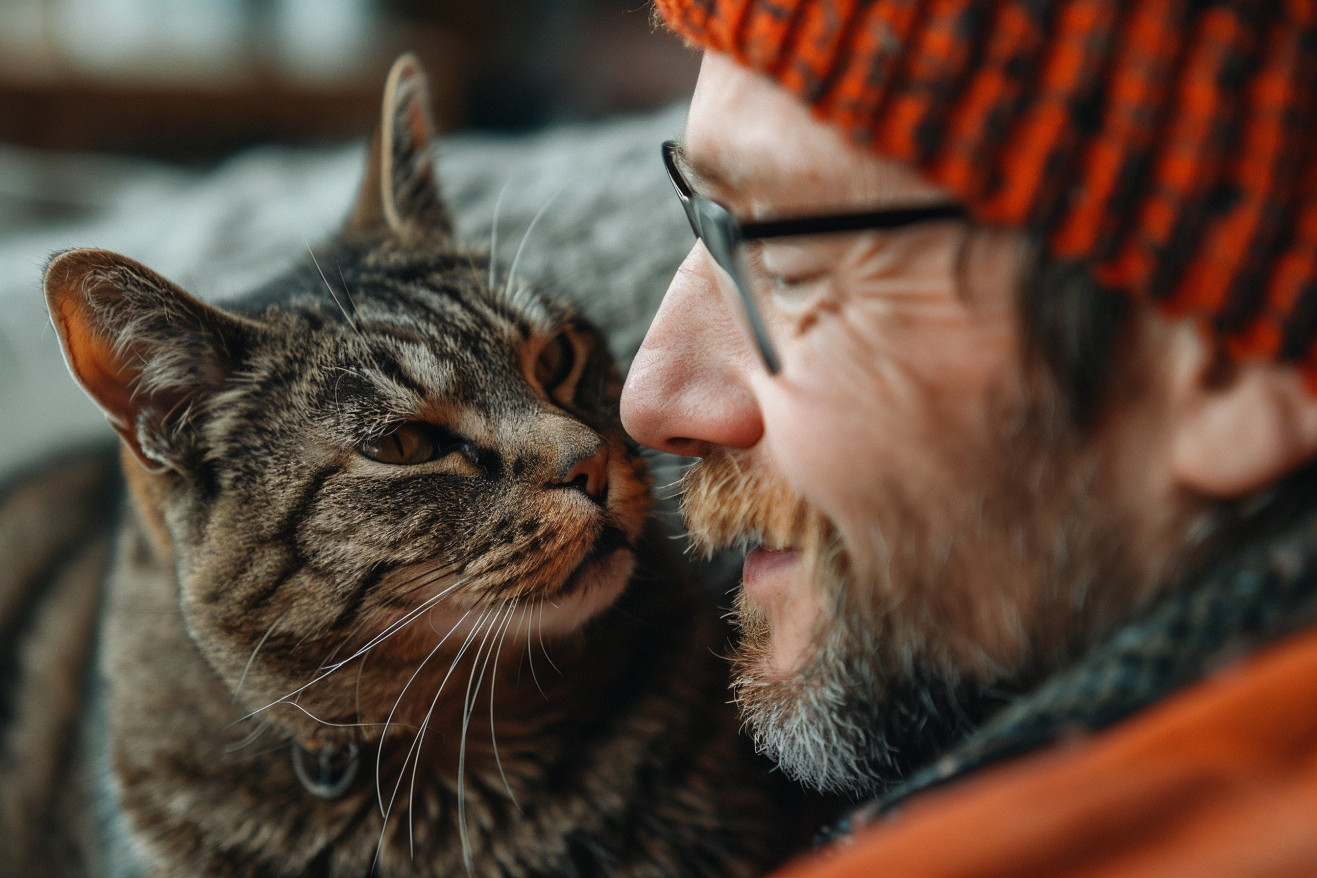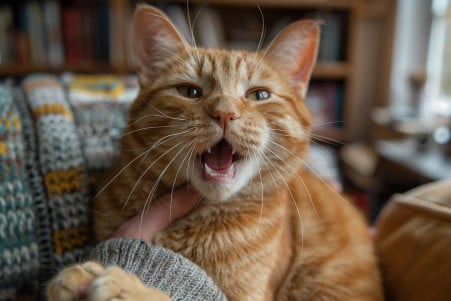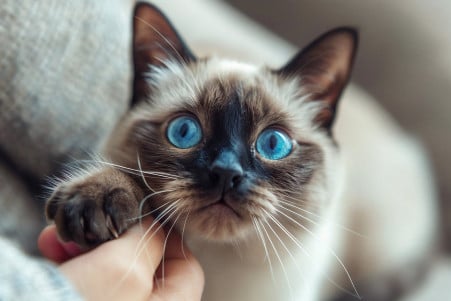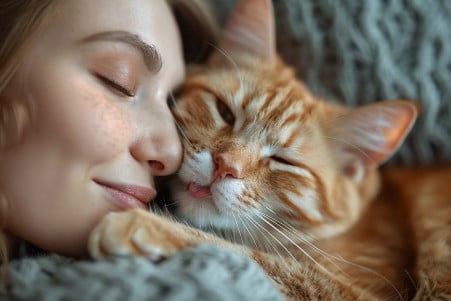Why Does My Cat Bite My Nose? Decoding Feline Affection & Play
8 March 2024 • Updated 6 March 2024

If you’ve ever been on the receiving end of a cat’s gentle nibble on your nose, you might wonder what your furry friend is trying to tell you. It turns out that there are several reasons why cats bite their owners’ noses, including to show affection, to mark their territory, and during play.
In general, gentle bites are a sign of trust and affection. However, if your cat’s biting becomes aggressive or happens too frequently, it’s a good idea to talk to a vet or a cat behaviorist.
In this article, we’ll take a deep dive into the world of cat behavior, drawing on research from veterinary medicine, animal psychology, and ethology to explain why your cat has chosen your nose as the object of their affection or play.
We’ll also look at research on cat body language, perception, and the impact of stress and anxiety on cats. By the end of this article, you’ll have a better understanding of how to interpret and respond to your cat’s behavior in a way that respects their individuality.
Why does my cat bite my nose?
Why Do Cats Give Love Bites?
If your cat has ever bitten your nose, you know that love bites are a sign of affection. Love bites are different from aggressive bites in that they are gentle, soft, and not intended to cause harm.
According to Catster, when your cat gives you a love bite, they are expressing their love for you and giving you their version of a kiss or a nuzzle. Love bites are a sign of the bond and trust between you and your cat.
To maintain that trust and to avoid encouraging your cat to bite more aggressively, it’s important to respond to love bites in a way that lets your cat know that their behavior is not acceptable.
BetterWithCats.net recommends that you redirect your cat’s behavior by offering them a toy to bite or petting them gently. This way, you can use positive reinforcement to let your cat know that you appreciate their affection but that biting is not an acceptable way to show it.
It’s also important to make sure that your response is gentle and loving so that you don’t damage the bond between you and your cat.
Distinguishing Between Playful Biting and Aggression
Play is a vital part of a cat’s daily routine, enabling them to get exercise, mental stimulation, and an outlet for their natural hunting instincts. Biting is a common part of play, especially for kittens who are still learning their boundaries.
According to Catster, playful biting is a normal part of a kitten’s development and should not be confused with aggression. That said, when a cat is overstimulated, the line between playful bites and aggressive bites can start to get blurry. Other signs of overstimulation in cats include dilated pupils, flattened ears, and a lashing tail.
To make sure you don’t get bitten on the nose and to ensure that your cat has positive play experiences, BetterWithCats.net recommends using toys to play with your cat. This will help them direct their biting instincts toward inanimate objects instead of your skin.
Wands, stuffed mice, and interactive feeders are all great options for promoting healthy play. That said, it’s also important to set boundaries during play. If play turns into biting, you can help your cat learn their limits by firmly saying ‘no’ and redirecting their attention to a toy.
That said, remember that a gentle nibble may be your cat’s way of asking you to play. With consistent positive reinforcement and by learning your cat’s body language, you can make sure that playtime is always fun and safe for both you and your cat.
The Nose Nip: Understanding Feline Affection and Play Signals
Cats are territorial animals, and scent is a big part of how they interact with the world around them. They have scent glands on their cheeks, paws, and flanks that they use to mark their territory. This includes their territory with their humans. If your cat bites your nose, it may be scent-marking you to show that you are part of its territory.
In addition to scent-marking, nose-biting is also a sign of trust and comfort. Cats may also bite your nose when they’re grooming you or when they’re feeling affectionate. In these cases, the behavior is a way of bonding and showing that you belong to them.
To help your cat feel more comfortable and to prevent nose-biting, make sure that you respect your cat’s territory and give them the space they need. This will help them feel more secure and less likely to use biting as a way of communicating.
What Does It Mean When a Cat Bites Your Nose?
Cats have a complex communication system that includes a wide variety of signals. According to International Cat Care, cat communication is more than just meowing and purring, it also includes visual signals like tail positions and ear movements, tactile signals like allorubbing and nose touching, and a wide range of vocalizations.
In this light, a nose bite could mean a lot of things. It could be a sign of affection, a territorial signal, or an invitation to play.
To understand what a nose bite means, you have to look at the cat’s other body language and listen to their vocalizations.
For example, the position of a cat’s tail can indicate that a cat is being friendly or aggressive, and a cat’s purr or hiss can show that a cat is happy or upset.
A study published in PMC even found that the vocalizations cats use to communicate are highly complex and can change based on the cat’s emotions and the situation. By understanding nose-biting in the context of these other forms of communication, we can better understand our cats and meet their needs, which will improve our relationship with them.
How to Train Cats to Be More Gentle
Bite inhibition, or the ability to control the pressure of a bite, is an important part of a cat’s behavior. According to the Wildlife Center of Virginia, kittens develop bite inhibition through play and social interaction with their mother and littermates. This is important for preventing injuries during play and is a normal part of social development.
Pet owners can use these same principles to train their adult cats to inhibit their biting. This can be done through vocal cues, such as saying “Ouch” when the cat bites too hard, and by withdrawing attention to show the cat that playtime is over when they bite.
Cats.com recommends that pet owners make sure that they are in a calm state of mind when training their cats and that they are aware of their cat’s body language to avoid fear or stress-based biting.
Bite inhibition can be positively reinforced through clicker training or target training, as suggested by Cats.com. With consistent training, behaviors like nose-biting can be turned into more gentle interactions. This not only makes interactions safer but also helps to build a better relationship between you and your cat.
The Nuzzle and the Gnaw: What Cat Nose Bites Really Mean
Cat nose-biting is a complex form of communication that can range from a loving nuzzle to a playful nip to a more aggressive bite. While cats may bite their owner’s nose for a variety of reasons, including affection, play, and territoriality, the meaning of these interactions is best understood when the bite is considered in the context of other behaviors.
Learning to understand cat body language is important for managing and interpreting nose-biting behavior. This includes not only discouraging unwanted behaviors but also learning to understand and appreciate the many ways our cats communicate with us. By doing so, pet parents can strengthen their relationships with their cats and ensure that they are responding to nose bites in a way that is patient and understanding, as we’ve discussed.
Ultimately, while it’s important to address biting behavior to prevent unwanted nips, it’s also important to ensure that we are meeting our cats’ needs and respecting their ways of communicating with us. By doing so, we can ensure that we are not only preventing unwanted bites but also strengthening our relationships with our feline friends.


